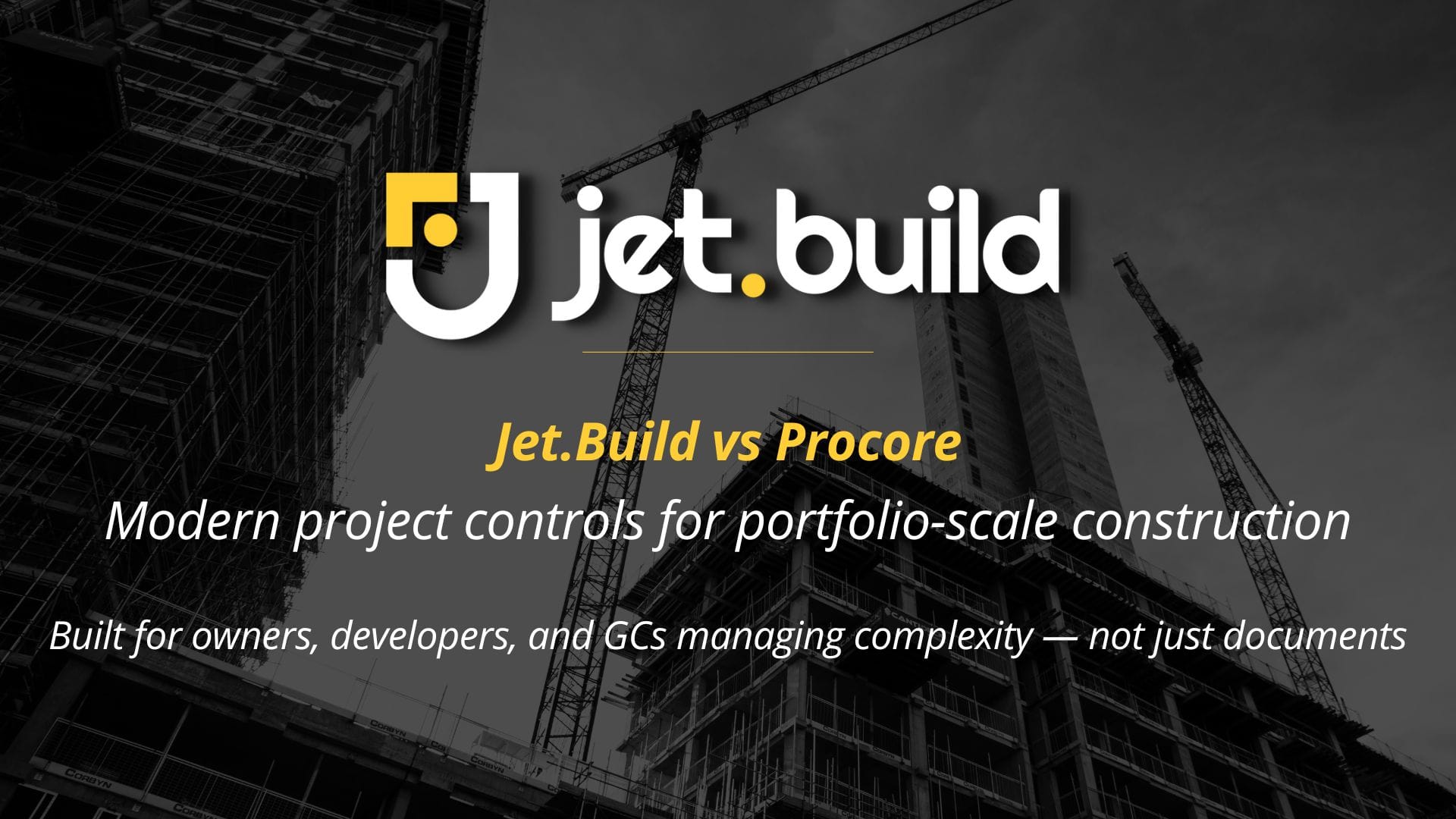Introduction
In construction and real estate development, maximizing team performance is essential. The success of a project relies on efficient collaboration among a wide range of stakeholders, from on-site crews to project managers, designers, and external contractors. In recent years, advancements in construction technology and management practices have transformed team productivity, but fully capitalizing on these requires strategy and the right tools.
Here, we explore five highly effective ways to enhance team performance for real estate developers and general contractors, incorporating real-world examples and insights on how Jet.Build supports each approach to foster improved outcomes.
1. Enhance Communication through Technology
Clear, consistent communication across a construction team isn’t just a best practice—it’s a necessity. Miscommunications lead to delays, budget overruns, and even safety risks. Effective communication is critical to ensuring everyone is on the same page on construction sites, where multiple contractors may be involved simultaneously, and real-time information is essential.
Challenges
Traditional construction management often communicates updates via emails, phone calls, or weekly meetings. These methods, however, frequently lead to information delays, confusion, and errors, especially on large projects. When a project spans multiple phases and stakeholders, including subcontractors, architects, and municipal authorities, communication gaps become even more problematic, impacting everything from deadlines to budgeting.
How to Implement Better Communication
Use digital project management tools that facilitate instant, centralized communication. A tool that provides access to real-time updates, documentation, and project-specific channels can reduce reliance on lengthy email threads and improve clarity for all involved parties.
How Jet.Build Supports Communication
Jet.Build enables real-time updates, document sharing, and live chat in one platform. For example, when an on-site team member needs to relay changes or updates to an architect, they can immediately upload relevant photos and documents, which are instantly accessible to all appropriate parties. This functionality minimizes delays, enhances transparency, and empowers faster decision-making.
Example:
Consider a real estate developer working on a multi-story office building. With Jet.Build’s mobile app, the on-site team can upload progress photos and RFIs (Request for Information) directly into the project portal. The project manager and stakeholders can access these updates in real-time, making it easy to resolve any issues before they escalate. This instant accessibility ensures everyone stays informed and eliminates the time lag often experienced with email-based communication.
2. Focus on Building a Cohesive Culture
A unified, cohesive team culture fosters trust, accountability, and engagement, directly influencing performance. Projects managed by cohesive teams are more likely to meet timelines and quality standards because each member is motivated and understands the importance of their role.
Challenges
In construction, team members often come from various firms, and crew members may only work together for short periods. This can challenge aligning values and expectations, making building a robust and cohesive culture harder. Maintaining team cohesion while managing multiple projects adds another layer of complexity for developers and contractors.
How to Implement Cohesive Culture
Developing a cohesive culture starts with transparency and trust. By regularly sharing project status, celebrating milestones, and fostering open feedback channels, team leaders can create an environment where every member feels valued and invested in the project’s success. Having a tool that provides visibility into project tasks, deadlines, and milestones helps to keep everyone on track. It allows team members to see how their work contributes to the bigger picture.
How Jet.Build Supports Cohesion
Jet.Build’s centralized dashboard provides an overview of tasks, timelines, and milestones, allowing all team members to stay informed. This transparency fosters accountability and alignment, helping individuals understand their role in achieving project goals. Additionally, task-tracking features allow everyone to see who is responsible for which aspects, creating a sense of collective purpose.
Example:
During a high-rise residential project, Jet.Build’s task-tracking feature enables every team member—from architects to contractors—to see the project timeline and their specific deadlines. This functionality helps align the efforts of various departments, builds a stronger sense of unity, and allows each member to feel integral to the project’s success.
3. Invest in Training and Upskilling
Training is essential in the construction industry, where complex projects and errors can be costly. By equipping team members with relevant skills and knowledge, you improve their efficiency and enhance their engagement and retention.
Challenges
In a fast-paced industry where time is money, many companies are reluctant to dedicate time and resources to training. Additionally, construction technologies are advancing rapidly, and staying up-to-date with new tools requires ongoing learning. Without adequate training, team members may be unaware of new functionalities, leading to under-utilization of valuable tools and potential project slowdowns.
How to Implement Training and Upskilling
Encourage continuous learning by offering both formal training programs and on-the-job coaching. Implementing user-friendly software with built-in training modules can help team members quickly get up to speed on essential functions, minimizing downtime.
How Jet.Build Supports Training and Upskilling
Jet.Build simplifies onboarding with an intuitive interface and built-in tutorials that allow new team members to quickly familiarize themselves with task tracking, budgeting, and scheduling functions. Furthermore, Jet.Build’s integrations with other software enable experienced team members to leverage their existing skills, facilitating seamless knowledge transfer and collaboration within the platform.
Example:
A construction company onboarding a new assistant project manager can use Jet.Build’s tutorial features to help them understand task assignment and budget tracking. By learning these essentials quickly, the assistant project manager becomes more effective, minimizing the risk of mistakes and helping the team meet project timelines.
4. Streamline Workflow and Delegate Wisely
Efficient workflow management is crucial for timely and cost-effective project completion. Real estate developers and contractors can optimize productivity, minimize bottlenecks, and ensure that each team member contributes effectively by strategically delegating tasks.
Challenges
Construction projects involve many tasks and often require the coordination of several contractors and subcontractors. Without a streamlined workflow, projects can become chaotic, with resources misallocated and critical tasks delayed. Without centralized project management, tracking progress and identifying bottlenecks is difficult.
How to Streamline Workflow and Delegate Tasks
Implement a project management tool that breaks down complex projects into manageable phases and assigns tasks based on team expertise. Centralized task assignment and resource tracking help project managers maintain workflow continuity and identify potential delays.
How Jet.Build Supports Workflow and Delegation
Jet.Build offers automated task assignment and tracking, helping project managers delegate work effectively. The platform also enables task segmentation, allowing teams to organize large projects into smaller, manageable sprints. This way, managers can allocate resources more effectively and align task deadlines with project objectives.
Example:
In a mixed-use development, Jet.Build can help the project manager assign specific roles for each construction phase, like excavation, framing, and finishing, by leveraging Jet.Build’s task segmentation, each team can focus on their strengths, ensuring that each stage is completed efficiently and on time. This organized approach prevents delays and minimizes the need for rework.
5. Prioritize Data-Driven Decision Making
Data-driven decision-making helps project teams operate proactively, allowing them to identify potential issues before they escalate and make necessary adjustments in real-time. Construction projects generate massive amounts of data daily, and utilizing this data can improve performance and profitability.
Challenges
Without the right tools, managing and interpreting data becomes cumbersome, especially on large projects where data is generated across multiple sites and stages. Real-time tracking of key performance indicators (KPIs) like cost variance, schedule adherence, and resource utilization can be challenging without automated reporting systems.
How to Implement Data-Driven Decisions
Use a project management tool with analytics and reporting capabilities to monitor and analyze project KPIs. This allows teams to adjust their approach based on insights rather than intuition, ensuring they can quickly address emerging issues.
How Jet.Build Supports Data-Driven Decisions
Jet.Build’s reporting and analytics tools comprehensively view project performance, tracking critical metrics such as budget vs. actual costs, scheduling adherence, and resource allocation. By leveraging customizable dashboards, project managers can monitor KPIs in real-time and make informed decisions to maintain project momentum.
Example:
In a complex infrastructure project, a general contractor can use Jet.Build to track labor and material costs. The contractor can flag potential cost overruns by comparing actual expenses against the initial budget. This data-driven insight allows for timely adjustments, preventing budget blowouts and ensuring the project remains profitable.
Additional Insights: How Jet.Build Revolutionizes Construction Management
Jet.Build is a project management platform designed specifically for the construction industry. Its suite of tools enables real estate developers and contractors to address common challenges effectively, providing capabilities tailored to every stage of a construction project.
1. Customizable Workflows
Jet.Build’s flexibility allows users to create workflows that match the unique requirements of each project. This customization empowers project managers to clearly define specific roles and responsibilities, ensuring that every team member understands their tasks and timelines.
2. Comprehensive Document Management
Construction projects generate and rely on extensive documentation, from blueprints and permits to change orders and daily reports. Jet.Build offers document management features that make storing, accessing, and sharing files accessible for team members. This centralized storage eliminates the risk of lost paperwork and ensures teams work with the latest documents.
3. Resource Allocation Tools
By integrating resource management into its platform, Jet.Build allows project managers to allocate labor and materials efficiently. This is particularly valuable for large-scale projects, where resource planning can significantly impact timelines and budgets.
4. Collaborative Project Spaces
For multi-phase and multi-stakeholder projects, Jet.Build provides collaborative project spaces where external consultants, contractors, and clients can access relevant information. This feature enhances transparency and reduces the need for back-and-forth communication, making project management more efficient and less time-consuming.
Conclusion
Team performance is critical to success in the construction and real estate development industry. Developers and contractors can maximize efficiency and minimize risks by focusing on improving communication, fostering a cohesive culture, investing in training, streamlining workflows, and prioritizing data-driven decision-making.
Jet.Build plays a crucial role in supporting these strategies, offering tools designed to meet the unique demands of construction projects. From real-time updates and task management to data analytics and document control, Jet.Build empowers construction teams to perform at their best, delivering projects on time and within budget. As the construction industry continues to evolve, platforms like Jet.Build is being adopted and can provide the competitive edge needed to succeed in today’s challenging market.
Check out The Veterans Who Build Show, sponsored by Jet.Build!








